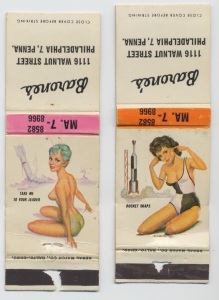 |
| Charlotte [NC] News, Jan. 3, 1900 |
Location: Charlotte, North Carolina, USA
Opened/Closed: c. 1900
The political news is so depressing these days that I'm digging into history as a kind of reprieve.
This 1900 article on the opening of a ladies restaurant is a good illustration of the basic observations we've made about the history of women's spaces.
1) Because men tend to have the monopoly on societal resources (money, authority, expertise, etc.), it is not uncommon for men to open/own/control women's spaces. Notice that two men (Messrs. Rutledge & LeGallais) opened this restaurant.
2) When men open women's spaces, they often do as an after thought, as a way to make money off of women after the market for men is saturated. This is the case here. By there own admission, there were "several well kept restaurants in the city for men" which did not admit women. So these guys saw an untapped market for women diners who want an "a-la-carte lunch." (And yes, I fully recognize that they did not mean all women, just wealthy white women of leisure.)
3) When men open women's spaces, they do not really limit them to women--even though the men's spaces rigorously excluded women. Notice that this "ladies restaurant is for "ladies or ladies with escorts." By escorts, they mean men. But as we know from other ladies restaurants we have examined, the "escort" rule was often broken, meaning it was not uncommon for more men than women to show up in a "ladies restaurant."
This is a persistent historical problem around women's spaces, and one that even feminists (especially of the "liberal" variety) are often unaware of (or consciously ignore). In efforts to be all "inclusive," women will make all kinds of amends to include males, while they somehow miss (or don't care) that men are not doing the same. Notice the debate around bathrooms these days--it's all about women's bathrooms becoming "inclusive" to "all genders." Meanwhile, men's bathrooms carry on just as they always have.
Does that mean that I think ladies restaurants were somehow "bad" then? Nope. Even with all their limitations of social/economic class and race, even though it was men dictating the terms, it still opened up a space for women to dine together and talk. And that's the start of all kinds of good things.

